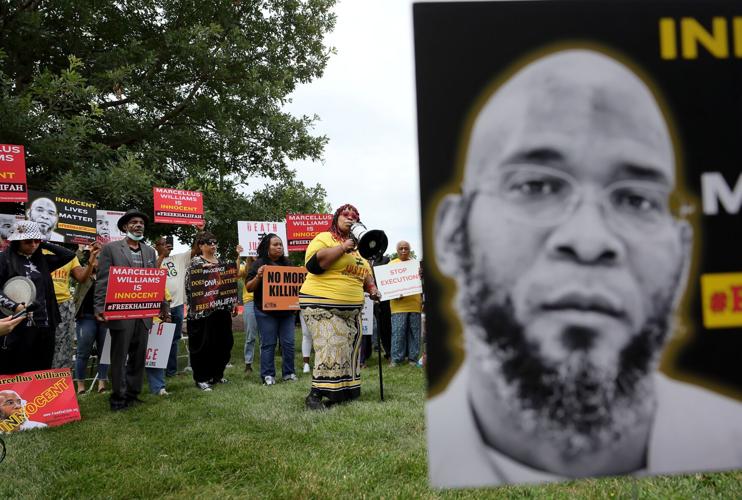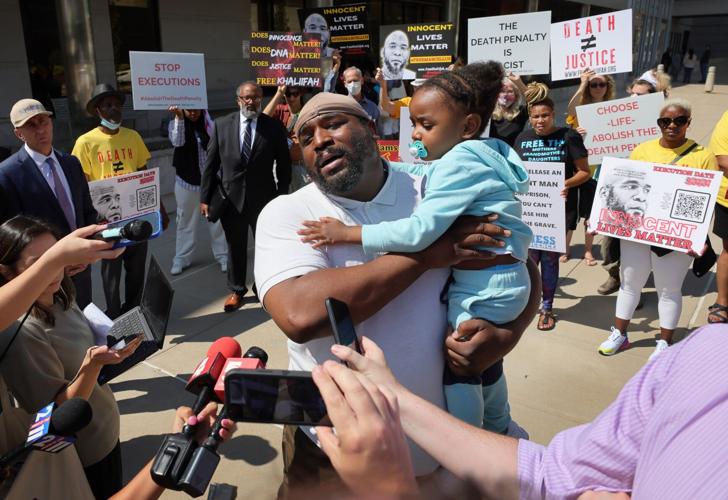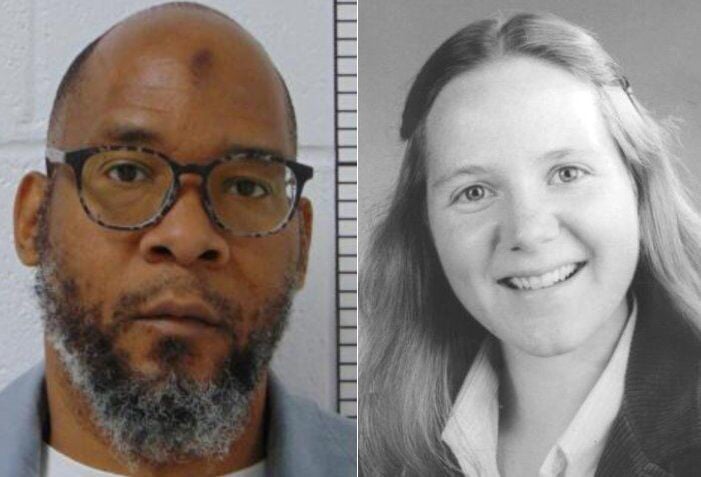JEFFERSON CITY â Marcellus Williams' attorneys pleaded with the Missouri Supreme Court on Monday to stay his scheduled Tuesday execution for the brutal 1998 killing of former Post-Dispatch reporter Felicia "Lisha" Gayle in her University City home.

Williams
Williams' attorney, Jonathan Potts, and St. Louis County Prosecuting Attorney Wesley Bell's office focused on trial prosecutor Keith Larner's admission during a circuit court evidence hearing last month that he illegally struck at least one juror because of his race in Williams' original criminal trial. Potts said St. Louis Circuit Court Judge Bruce Hilton, who upheld Williams' conviction earlier this month, erred when he did not address this violation of Williams' constitutional rights.
The jury that found Williams guilty of first-degree murder and sentenced him to death was made up of 11 white people and one Black person. The Missouri Supreme Court reviewed a similar claim against Larner's juror strikes in 2003 and ruled the prosecutor did not break the law.Â
People are also reading…
"When (Larner) was subjected to cross-examination, he admitted unequivocally he struck a juror because he was a young Black man with glasses," Potts said, arguing that the juror in question said he could consider the death penalty and gave Larner no other legal reason to strike him from the pool of jurors. He said Larner's August testimony amounted to new evidence that needed to be reviewed more thoroughly by a court.
Larner, during that circuit court hearing, said he struck the juror because he had the same "piercing eyes" and similar eyeglasses as Williams. Later in that same hearing, he said the two looked like brothers.

Marcellus Williams II holds his son Sadir Williams, 3, as he speaks to reporters outside the courthouse in Clayton about a deal prosecutors reached with his father Marcellus âKhaliifahâ Williams that changes his death sentence to life in prison without the possibility of parole on Wednesday, Aug. 21, 2024. The change in sentencing came about five weeks before Williamsâ scheduled execution date for the murder of Lisha Gayle, who was stabbed 43 times in her suburban home in August 1998. He was convicted of the killing in a 2001 trial.
The prosecutor struck six of the seven Black people during the 2001 trial's juror selection.
Potts acknowledged Monday that his defense team is no longer focused on claiming Williams' innocence. The innocence argument was shattered when the unknown DNA on the knife, which lawyers argued belonged to the actual killer, was consistent with the trial prosecutor and investigator on the original case. Both men admit to handling the knife pre-trial without gloves.
Finally, Potts argued that Williams' rights were violated because his lawyers were not given enough time in the August hearing to present all their testimony. Hilton limited Williams' attorney, Bell's office and the Missouri Attorney General's Office to two hours of argument each.
Michael Spillane, an attorney for Missouri Attorney General Andrew Bailey's office, told the judges on Monday that Potts did not use all the time allotted to him in the first place. Potts conceded that point and said they wanted Williams to testify, but that would have taken more than an hour.
Spillane also defended Larner's gloveless handling of the knife, noting that Larner did not know about touch DNA in 2001 and was following his office's protocol at the time.
He also pointed out that even Hilton, the circuit court judge, said it "was a mischaracterization" of Larner's testimony to suggest he admitted to striking the juror based on his race.
"There is no evidence at all and I think that the judge is kind of a hero because he stood up and followed the law," Spillane told the Missouri Supreme Court judges. "I would say that also about the prosecutor."
Potts countered and said Larner should have known more about DNA, pointing out that the popular police forensics show "CSI" had premiered the year before the trial. He also said it was "incredibly suspicious" that the notes Larner took during the juror selection process were not found in the case's evidence file.
Potts urged the court to reverse the ruling or remand it to the trial court for further findings.
Spillane left the courthouse before he could be asked for comment.
Matthew Jacober, special counsel for Bellâs office, filed the appeal last week with the stateâs high court, asking it to review Hiltonâs ruling upholding Williamsâ conviction.
After the Missouri Supreme Court hearing Monday, he told the Post-Dispatch that the timing of all this is problematic.
"This is not where we want to be, the timing of everything is difficult," he said. He added that he expects the court's ruling will come no later than Tuesday morning.
Nimrod Chapel, president of Missouri NAACP, told media after the hearing that more time is needed for the courts to review the case before Williams is executed.
"I'll tell you that dozens and dozens of faith leaders, in conjunction with more than half a million people around the country and internationally, are asking Gov. (Mike) Parson to halt this execution," he said. "In this case, it's an actual case of innocence, and it would make every Missourian and every taxpayer in the state complicit in the murder of an innocent man. And that we cannot have."
Standing with Chapel, Michelle Smith also pointed out that Gayle's family does not support the death penalty and does not want Williams executed. Smith is co-director of the Missourians To Abolish The Death Penalty and says sheâs a close friend of Williams.
"It seems that the only people who want Marcellus to die is the state," she said, referring to the attorney general's office.
Williamsâ attorneys have filed appeals with two other courts.
They first asked the Missouri Court of Appeals Eastern District to reconsider its 2010 denial of Williamsâ claim that Larner unconstitutionally removed Black prospective jurors because of their race. The almost 400-page motion presented the new evidence from Larnerâs new testimony.
United States District Judge Rodney Sippel on Tuesday denied that motion because he said he could not rule on it without permission from the United States Court of Appeals for the Eighth Circuit. He also wrote that Larnerâs new testimony did not warrant a review of those claims and his previous ruling.
Williams then asked the U.S. Supreme Court on Wednesday to halt his execution and review a claim that his due process was violated when Parson broke up a review board before it could reach a conclusion about his innocence. Bailey's office has filed a motion arguing against that claim.Â
The U.S. Supreme Court had not filed a response to those requests as of Monday morning.
Williams has unsuccessfully appealed and challenged his first-degree murder conviction for more than two decades.
In January, Bellâs office filed to vacate Williamsâ conviction, arguing he was innocent.
Williams and his defense team have maintained his innocence, and have repeatedly pointed out that no physical evidence connects him to the crime other than a stolen laptop he sold to a neighbor.
The prosecutionâs two main trial witnesses â Williamsâ former cellmate and an ex-girlfriend â have since died.
US Representative Cori Bush asked Missouri Governor Mike Parson and Congress to help Marcellus Williams before he is executed, calling the practice 'racist,' 'flawed and inhumane.'











